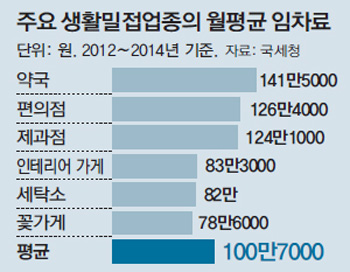Average monthly rent for shops amounts to $861 in Korea
Published on | Source
The monthly average rent of self-employed peoples small businesses, for which the contract date of store space rent is registered with state realty rental registry, amount to about 1 million won (861 US dollars) per month, a new report suggests.
Advertisement
According to a report on current situation of rent of small-sized store spaces, which was released on Friday by the National Tax Service, of the 230,045 businesses, for which the contract date of their store rent was registered from 2012 to 2014, the average monthly rent for 142,238 stores that are classified into businesses closely linked with peoples living amounted to 1 million won (867 dollars). Under the current law on protection of store rent contract, if the self-employed with small businesses whose monthly rent contract translated into contract with lump sum key deposit valued at 400 million won (345,000 dollars) or less in Seoul, 300 million won (258,000 dollars) or less in Incheon and Gyeonggi Province, and 240 million won (207,000 dollars) or less in metropolitan cities, register the contract date of their store rent to the local tax office, they can have their lump sum key deposit guaranteed for preferential reimbursement before other creditors if the building is put to auction or public sale.
According to analysis by the National Tax Service of businesses, which applied to register The Contact date of their store rent, by business type, the monthly rent for drug stores was the highest at 1,415,000 won (1,220 dollars) among businesses closely linked to peoples living. It was followed by that of convenience stores (1,264,000 won or 1,010 dollars), and bakery shops (1,241,000 won or 1,069 dollars). Businesses whose monthly rent is the lowest was florist shops, which are contracted for 786,000 won (677 dollars) per month, while other stores with relatively low monthly rent were laundry shops (820,000 won or 706 dollars), and interior decoration shops (833,000 won or 717 dollars).
Businesses closed linked with peoples living were most commonly situated on the first floor, as they accounted for 65.5 percent, while those on the second floor or higher took up 28.3 percent, and those in the underground floor came to 5.6 percent. Businesses whose most preferred location is the first floor was convenient stores, as 93.5 percent of them were sitting on the first floor. Many of the operators of cram schools (86.0 percent), billiards shops (81.6 percent), and PC cafes (73.0 percent) had their shops on the second floor or higher.
The area where store rent is the highest in Seoul was Gangnam-gu where the average monthly rent per store was 1,827,000 won (1,574 dollars). The average monthly rent was also high in its neighboring district of Seocho-gu at 1,683,000 won (1,450 dollars). Store rent per sq. meters was higher in old city centers of northern Seoul such as Jung-gu (32,252 won or 28 dollars) and Jongno-gu (28,589 won or 24.6 dollars). However, considering that most store spaces for businesses in highly commercial districts such as Sejongdae-ro in Jongno and Gangnam Station in Seoul are not subject to registration of contract date for store rent due to their hefty rent, actual monthly rent in these areas would be much higher than that, according to the National Tax Service and the realty business community.
